After years of offering consumers rewards and sign-up bonuses, credit card companies have gotten more tight-fisted about the perks they offer. That’s one reason why Fold, a crypto startup, believes there will be demand for its new product: a Visa card that offers cash back in the form of Bitcoin.
On Thursday, Fold announced that users can now receive a physical card that will let them pay at any merchant that accepts Visa and get 1% to 2% back in Bitcoin for any purchase they make.
While physical cards are nothing new in the crypto world—Coinbase recently unveiled a Visa card that lets users pay by connecting to their Bitcoin account—the Fold offering is novel in that it lets customers spend cash and earn cryptocurrency. Those who sign-up must fund the card via a bank account before using it and receiving getting rewards, making it something like a hybrid of a debit and a credit card.
According to Meltem Demirors, a well-known crypto investor whose firm CoinShares has backed Fold, the Bitcoin rewards card will appeal to people who want to hold onto cryptocurrency rather than spend it. And while the idea of Bitcoin rewards may seem niche, Fold CEO Will Reeves believes it will catch on, in part because of efforts by other card companies to impose limits on frequent flyer and other rewards earned.
“A lot of people say, ‘what’s so great about Bitcoin rather than regular rewards?’ My answer is Bitcoin preserves the freedom and flexibility of cash, while giving you the upside of a high performing asset,” said Reeves.
The Bitcoin rewards are paid out at market rates at the time of the transaction. Fold users can then transfer the Bitcoin they accrue to a cryptocurrency wallet, or spend it with retailers within Fold’s app, or simply hold on to it. Card users don’t pay fees.
While Bitcoin is a notoriously volatile asset, losing around 50% in the market meltdown over the coronavirus in recent months, it has recently made up some of those losses. It currently trades at around $7,300, which is still far off its all-time high in late 2017 of nearly $20,000.
For Fold, the Visa tie-up is a chance to broaden its rewards program to far more merchants. Currently, the app-based service provides customers with codes to make purchases with select retailers like Amazon, Uber and REI. The card will mean users can shop anywhere that accepts Visa.
Fold is also hoping so-called gamification elements will increase the service’s appeal. In practice, this means Fold users will be able to engage in daily promotions in the app, including a spinning wheel that offers rewards of up to 10% at select merchants.
In a statement, a Visa executive said Fold’s card offering reflects the benefit of the company’s “Fast Track” program, which offers startups access to Visa’s financial expertise and technology.
More must-read tech coverage from Fortune:
—How the coronavirus stimulus package would change gig worker benefits
—Zoom meetings keep getting hacked. How to prevent “Zoom bombing”
—Why China’s tech-based fight against the coronavirus may be unpalatable in the U.S.
—Hospitals are running low on the most critical supply of all: oxygen
—Listen to Leadership Next, a Fortune podcast examining the evolving role of CEO
—WATCH: Best earbuds in 2020: Apple AirPods Pro Vs. Sony WF-1000XM3
Catch up with Data Sheet, Fortune’s daily digest on the business of tech.











